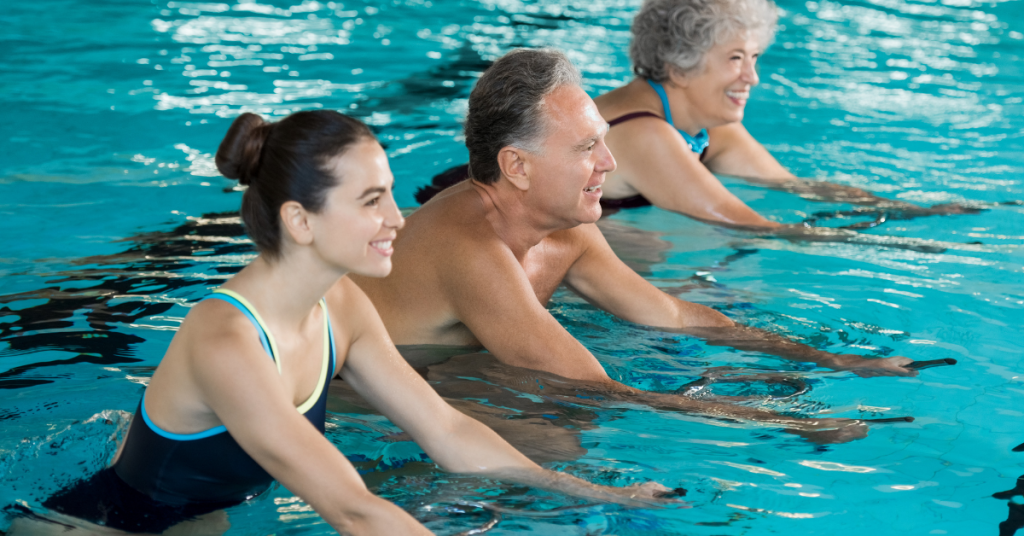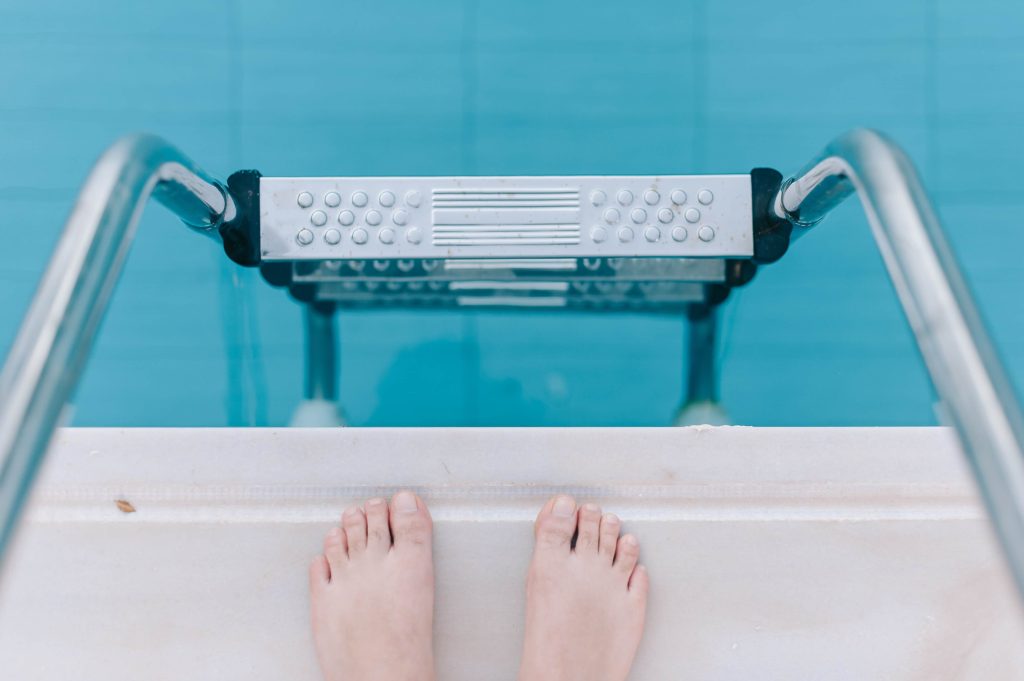Water cycling is a unique, low-impact workout that combines the benefits of cycling with the resistance of water. Whether you’re looking to improve cardiovascular health, build muscle, or recover from an injury, water cycling can help you achieve your fitness goals.
This blog explores the benefits of water cycling and how to get started with your exercise on aquatic bikes. It also compares aqua cycling with land-based cycling.
Also Read: The Ultimate Guide to Water Fitness: Benefits, Exercises, and Equipment
What is Water Cycling?
Water cycling is a low-impact exercise performed on a stationary bike placed in a pool. It combines the benefits of traditional cycling with the added resistance and buoyancy of water.
The water’s resistance provides a full-body workout that engages muscles in the legs, core, and arms while being gentle on the joints.
What are the Benefits of Aquatic Cycling?
Here are the benefits of cycling on an aquatic bike:
1. Low Impact on Joints
Water cycling puts minimal stress on your joints. The buoyancy of water supports your body, reducing pressure on areas like the knees and hips. This makes it ideal for people with joint pain or injuries.
2. Exercise at Your Own Pace
You can adjust your speed and effort level during water cycling. Whether you want a light workout or an intense session, you can exercise per your needs and preferences. This flexibility makes it great for all fitness levels.
3. Best for People with Arthritis and Joint Issues
Water cycling is gentle on the body, making it perfect for people with arthritis. The water helps reduce pain and stiffness while allowing movement without causing further strain. It’s a great way to stay active without hurting yourself.
4. Burn Calories Fast
Water’s resistance makes cycling in the pool more challenging. This means you burn calories quicker than on a land-based bike. Even at a moderate pace, you can expect an effective workout.
5. Mentally Refreshing
Exercising in water has a calming effect on the mind. The cool water and gentle movements can help reduce stress and anxiety. Water cycling gives you a mental break while improving your fitness.
6. Full Body Workout
Water cycling engages nearly every muscle in your body. Your legs power the bike, but your core and arms also get a workout. This makes it an efficient, all-around fitness activity.
7. Helps in Muscle Growth
The resistance from the water helps strengthen and build muscle. As you pedal, your muscles are constantly challenged, leading to growth and toning. Over time, you’ll notice stronger legs, core, and arms.
8. Enhances Balance, Coordination, and Flexibility
The water’s resistance helps improve your balance and coordination. Staying steady on the bike requires core engagement, which also boosts flexibility. These benefits carry over into other physical activities.
9. Improved Cardiovascular Health and Endurance
Water cycling is an excellent cardio workout. It strengthens your heart and lungs while increasing your stamina. Regular sessions will lead to improved cardiovascular health and greater endurance.
10. Optimal Lymphatic Drainage
The gentle movement of water promotes better circulation and lymphatic drainage. This helps your body remove toxins and reduce swelling. It’s a natural way to support your immune system and overall health.
11. Improved Body Posture
Water cycling encourages good posture, as you need to sit upright to maintain balance. The resistance of the water strengthens your back and core, which improves posture over time. This helps reduce slouching and back pain.
12. Improved Overall Well-being
Regular water cycling sessions promote overall physical and mental health. Exercising on a water bike also makes you feel stronger, healthier, and more energized.
13. Effective Rehabilitation
Water cycling is often used in rehab settings to help people recover from injuries. The water’s support allows for safe movement while strengthening muscles and restoring function. It’s a great option for easing back into exercise.
14. Developed Mental Strength
As you challenge yourself in the water, you build mental resilience. Overcoming the natural resistance of the water helps boost your focus and perseverance.
15. Enhanced Blood Flow
The constant movement of water cycling promotes better blood circulation. This increases the blood flow (oxygen and nutrients) to the muscles involved in the exercise and leads to quicker muscle recovery.
16. No Muscle Soreness
Water’s buoyancy reduces the impact on your muscles, which helps avoid soreness. After a workout, you’ll typically feel less fatigued than with land-based exercise. This makes water cycling a great option for consistent training.
17. Energy Efficient Exercise
Water cycling uses minimal equipment (water bikes), which requires little to no energy consumption compared to treadmills or ellipticals that rely on electricity. This makes it a more eco-friendly alternative in the fitness space.
18. Connection to Nature
For those practising water cycling outdoors, there’s a connection to nature. If you are a water enthusiast and love exercising then aqua biking is a great combination of the two.
How to Start Your Aquatic Fitness Journey Through a Water Bicycle
Start your aqua fitness journey through a water bike to achieve your rehabilitation, weight management, and fitness goals faster. Here is the step-by-step guide on how to work on a water bicycle:
Adjust the Water Bicycle for Your Height
Now, adjust the bike seat so your legs are slightly bent as you pedal. Set the handlebars at an accessible height so you can sit upright.
Get into the Water and Mount the Bike
Step into the water and sit on the bike. Make sure the water is waist-high and make yourself stable before starting.
Start Pedaling Slowly to Warm Up
Begin pedalling slowly to warm your muscles and get used to the water’s resistance. Keep a good posture and try to engage your core.
Increase Pedaling Speed for Cardio
Gradually increase your speed to raise your heart rate and improve your endurance. Keep the movements smooth and control your pace for 10-15 minutes.
Add Resistance to a Challenge
You can add more resistance via the breaking resistance device, if available. Alternatively, you can take the bike out of the water and increase the opening of the blades under your pedals. Focus on using both your quads and hamstrings to push through the water.
Incorporate Interval Training
Alternate between fast pedalling for 30 seconds and slower pedalling for 1 minute. Repeat this cycle for 15-20 minutes to improve endurance and burn calories.
Incorporate Upper Body Movement
You can use the hand pedals (if available) to engage your arms and shoulders. Alternatively, mimic arm movements to engage your upper body while cycling.
Cool Down Slowly
Now, slow down to gradually reduce your heart rate and relax your muscles. Stretch your arms and legs gently in the water after you finish cycling.
Water Cycling vs. Land-Based Cycling
The table below shows the key differences between aqua cycling and cycling on land based on various aspects:
| Aspect | Land-Based Cycling | Water-Based Cycling |
| Impact on Joints | Moderate to high impact on knees, hips, and lower back | Very low impact, ideal for joint issues, reduced stress on knees and joints |
| Calorie Burn | High-calorie burn, dependent on speed and terrain | High-calorie burn, even at a moderate pace due to water resistance |
| Muscle Engagement | Primarily engages leg muscles, some core activation | Full-body engagement, especially legs, core, and arms due to water resistance |
| Cardiovascular Benefits | Excellent for improving cardiovascular health | Excellent, with added resistance from water making it more intense |
| Accessibility | Can be done outdoors or indoors (stationary bike) | Requires access to a pool or aquatic facility |
| Environmental Impact | Higher energy consumption (indoor cycling needs electricity) | Low energy consumption, eco-friendly in pools or open water |
| Suitability for Beginners | Can be a bit hard for beginners, especially on rough surfaces | Beginner-friendly, low learning curve, great for new exercisers |
| Rehabilitation Benefits | Not ideal for those with joint issues or injuries | Excellent for rehabilitation, especially for joint injuries and mobility issues |
| Intensity Control | Can be adjusted by changing speed, resistance, or terrain | Resistance is naturally controlled by the water, providing a steady challenge |
| Balance and Coordination | Improves balance, but is more challenging for beginners | Great for improving balance and coordination due to water’s support and resistance |
| Flexibility and Range of Motion | Limited improvement in flexibility | Great for improving flexibility, as the water allows for a greater range of motion |
| Core Engagement | Engages core moderately, especially during intense cycling | Excellent core engagement, especially with water’s resistance and the need to maintain balance |
| Post-Exercise Recovery | Potential muscle soreness, especially after intense rides | No muscle soreness, water helps with recovery and reduces inflammation |
Water Cycling Tips for Beginners
Are you a beginner at water cycling and seek expert advice before starting your fitness journey? Well, don’t get overwhelmed; it’s not that harsh. Here are a few tips to consider for safe and effective underwater cycling:
- Start with a gentle warm-up before pedalling.
- Adjust the bike seat to your height for comfort.
- Keep a good posture during water biking.
- Keep your core engaged to improve stability.
- Begin with slow pedalling and gradually increase speed.
- Use the water’s resistance to challenge your muscles.
- Stay hydrated during your session.
- Take breaks if needed to avoid overexertion.
- Stretch after the workout to relax your muscles.
- Gradually increase workout intensity over time.
Frequently Asked Questions
Where do I buy the best aqua bikes in Australia?
Aquatecfitness is the best aquatic bike provider in Australia. With durable and lightweight materials, customized models and colors, and wallet-friendly water bikes, you can invest smartly in your home aquatic fitness. The best thing about us is we provide aquabike shipment services all over Australia and we have stock available here.
Does the bike move in the pool?
No. The bike remains static in the water. For water cycling, all you need is to move the pedals.
Do I need swimming skills for water cycling?
No, you do not need swimming skills for water cycling. Water cycling only involves riding a specially designed bike that operates on the surface of the water. However, learning how to swim is the best life-saving skill for every kind of water.
Is aqua cycling suitable for pregnant women?
According to the State of Victoria’s Department of Health, stationary or water cycling is beneficial for pregnant women. However, it depends on individual circumstances and the stage of pregnancy. We strongly insist on consulting your doctor before doing water cycling in any stage of pregnancy.
How often should I do aqua cycling for the best results?
To achieve the best results with aqua cycling, the frequency depends on your fitness goals, current fitness level, and overall health. Below is a generalized list of how often should you do water cycling for maximum results:
General Fitness and Well-being: 2–3 times per week, Duration: 30–45 minutes per session.
Weight Loss or More Intense Fitness: 3–5 times per week, Duration: 45 minutes to 1 hour per session.
Pregnancy or Postpartum Fitness: 2–3 times per week, Duration: 20–30 minutes per session.
Wrapping Up
Water cycling is a low-impact exercise with many benefits, including improved cardiovascular health. It strengthens muscles and increases flexibility while being gentle on the joints. This makes it ideal for people with joint pain, pregnant women, or those recovering from injuries.
Aqua cycling provides a full-body workout that engages the legs, core, and arms. Buy an aqua bike at Aqutecfitness in Australia and speed up your fitness, weight loss, and rehab goals.


